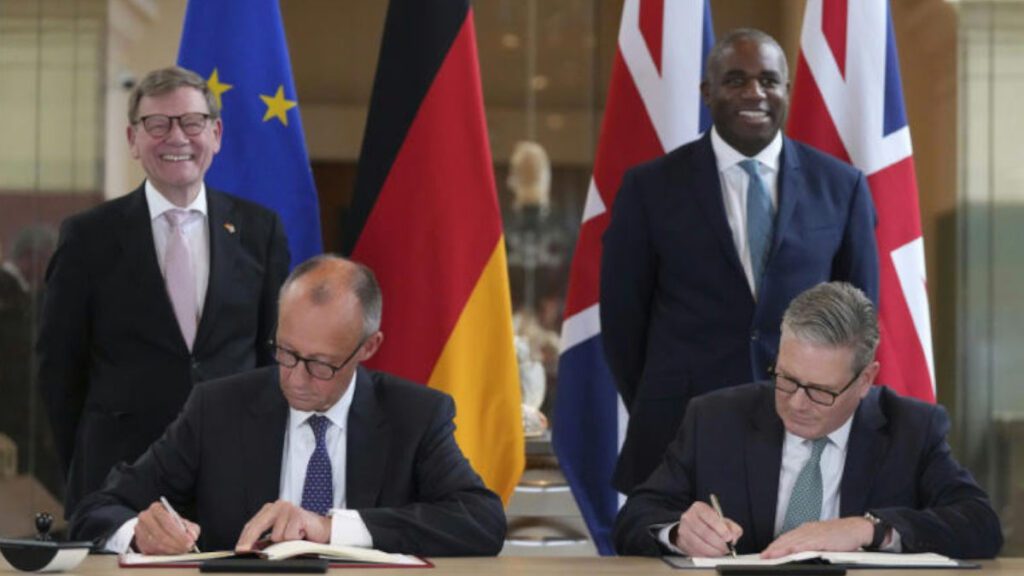Britain and Germany have signed a landmark “Kensington Treaty” to deepen defence cooperation and crack down on people-smuggling, marking a new chapter in bilateral ties during German Chancellor Friedrich Merz’s first official visit to the United Kingdom.
The treaty, described as the first “friendship treaty” between the two nations, was signed on Wednesday, July 17, 2025, at the Victoria and Albert Museum in London before both leaders held bilateral talks at 10 Downing Street.
British Prime Minister Keir Starmer hailed the deal as a turning point, saying it would lead to closer security coordination, joint military projects, and significant progress on addressing undocumented migration across the English Channel.
“It’s a clear sign that we mean business in every way,” Starmer told reporters, adding that Germany would change its laws this year to allow for the seizure of small boats used in Channel crossings, a move aimed at dismantling smuggling syndicates operating in both countries.
While Berlin has not yet confirmed when the legislative changes will take effect, Starmer said the agreement would empower German police to raid storage facilities and confiscate boats before they reach smugglers.
Military Cooperation and Joint Weapons Development
The agreement includes a new mutual defence pact affirming that any strategic threat to one country would be considered a threat to the other.
“There is no strategic threat to one which would not be a strategic threat to the other,” the treaty states, with both nations pledging to assist each other, including militarily, in case of an armed attack.
Beyond NATO’s umbrella, the Kensington Treaty will also expand joint military projects, including efforts to increase exports of Typhoon jets and Boxer armoured vehicles. Starmer’s office projected “billions of pounds in additional orders” from the joint defence industry venture.
The two leaders also announced plans to develop a new precision strike missile with a range of over 2,000 kilometres within the next decade—a move widely interpreted as part of Europe’s effort to bolster defence capability amid rising threats.
Migration Pressure and Political Response
With over 22,500 undocumented migrants arriving on England’s southern coast this year alone, migration remains a top priority for Starmer’s Labour government, especially as the anti-immigrant Reform UK party gains ground in the polls.
The treaty is expected to strengthen joint enforcement efforts along migration routes from northern France and Belgium into the UK, particularly by disrupting logistical chains used by trafficking gangs, including boat storage and assembly networks in Europe.
Youth Exchange and Border Easements
Chancellor Merz, speaking in German during the press briefing, announced that German and British schoolchildren would no longer need visas to participate in a new youth exchange programme under the treaty.
He praised the initiative as a way to foster mutual understanding among the next generation, calling it “a good basis for the further development of our relations.”
In a move aimed at easing post-Brexit travel complications, the two governments also agreed to allow some UK passport holders to use Germany’s fast-track eGates at airports. The two sides committed to improving rail links, with Eurostar announcing a direct London-Frankfurt route set to launch in the early 2030s.
European Relations in a Post-Brexit Era
The Kensington Treaty follows closely on the heels of a state visit by French President Emmanuel Macron, making July a historic month for Britain’s efforts to rebuild post-Brexit ties with major European powers.
While acknowledging his personal regret over the UK’s departure from the EU, Merz emphasised that London, Berlin, and Paris were converging on critical policy areas, especially security and migration.
Starmer and Merz reaffirmed their support for Ukraine and pledged to participate in US-led efforts—under former President Donald Trump’s plan—to finance arms for Kyiv via NATO partnerships.
Chancellor Merz is set to host Macron in Berlin next week for further talks on regional security and migration, underscoring growing continental alignment despite Brexit’s lingering aftershocks.


